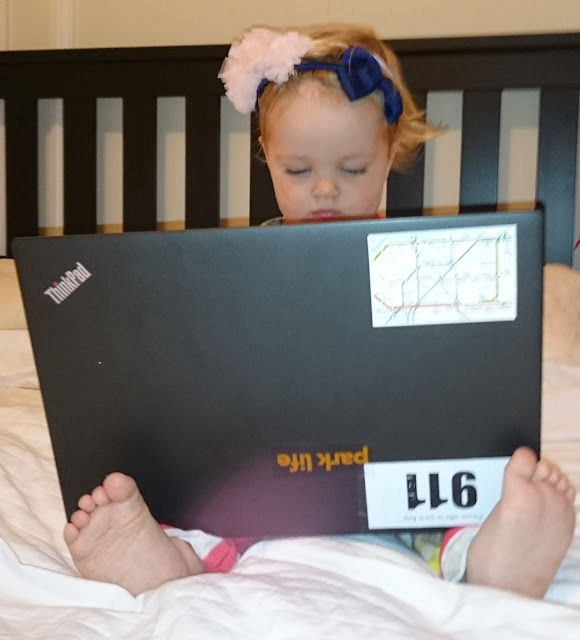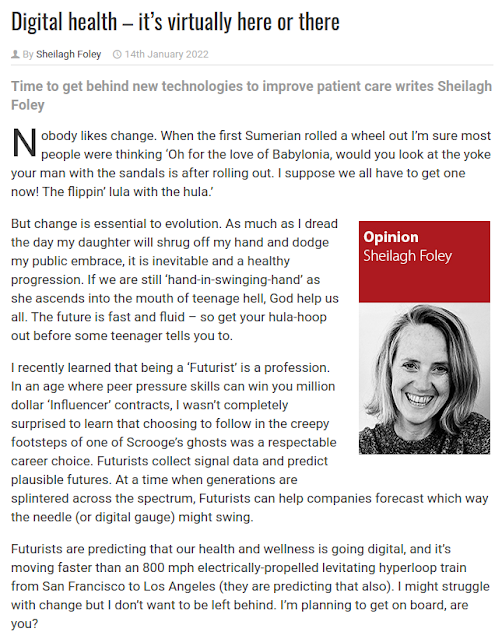The Irish Medical Times: Digital health - it's virtually here!
Casting aside, for a moment, the world of wearables, from your smartwatch to your smart toilet (it’s a thing), my concern is the doctor and patient pathway. Twenty years from now, perhaps even ten years from now, will we still be picking up a phone and making an appointment to see a GP with the nice [insert description of choice] secretary? Will we be waiting patiently for a phone call/letter to inform us that the Gods of Lists have finally plucked our name from sheets of anonymity and called us for the long awaited procedure? Will we be relying on a badminton game of letters from Doctor X to tell Doctor Y that Doctor Z has the ABC on our 123 up at the old infirmary?
Or shall we hop, skip and jump, broken legs and all, into the world of online medicine where Dr Al Gorithm rules ok. The doctor’s receptionist is a portal; a corporeal cacophony of one’s character where test results, reports, appointment information, medical history, list of medications, history of illness, hospitalizations, doctors seen, etc are all a double click away.
I first experienced Patient Portals in America when I registered my daughter with a pediatrician. Alongside filling in swathes of information in triplicate I was also handed a piece of paper with a weblink and a password (heaven forbid they should email it to me, I also used the word ‘weblink’ so they may have thought I was gently aged). I initially ignored it for weeks, as I do most bits of paper I am handed, but as my due date arrived I dug it out.
As I entered this portal my mind was blown - not least of all because I used it as an excuse to say the word ‘portal’ several times out loud to myself. I felt like I was embarking on a time travelling adventure. The information was pretty basic, probably because my daughter had yet to be born, but as years passed they were soon filled - inoculation records, her milestones noted, and past illnesses (the time she had pneumonia and I had to bring her to hospital, brings an ole lump to my throat).
As my phone became an important member of my family, the portal became an app and multiplied. I diversified my health portfolio of problems and collected apps for various hospitals. Letters dried up, everything was now electronic. Because I keep one large dinosaur foot in the past I would often request the results be sent to me by letter, it seems somehow more official, more real. Of course it required filling in forms, in triplicate. In an ironic suicide murder pact, paperwork will be the death of paper.
Upon my return to Ireland I signed up to various doctors, always asking for portals or apps, to be met with blank stares and hints of suspicion. One secretary swiftly replied ‘A portal? She’s a medical doctor, not Dr Who!’. I felt like a Sumerian, sheepishly hiding the wheel behind my back.
I appreciate it could be costly to implement new technology and difficult to educate an elderly population on a new way of doing things. But I fear the HSE may be like the lumberjack in the woods cutting the log with a blunt saw. As the story goes, a lady appears and suggests he sharpens the saw to speed up the work, but the lumberjack says he “can’t stop now, it will take time away from the cutting.”
Progress can be made. St James’s Hospital were the first to introduce electronic patient files; they are never going back to the manilla madness. Take it to the next level St James’s and introduce an app.
I am worried that healthcare will go the way of the banking industry, where the dinosaurs didn’t invest in technology in time and the ‘new kids on the block’ crypto banks swooped in with fandangled apps and fancy fintech. Don’t let private money and Big Tech dictate what happens next in Healthcare. I appreciate by its very nature and the demands put on it the HSE is not a nimble agile operation, change is not easy, but it will happen - whether we like it or not.
On a recent visit to the UK I discovered, to my surprise, NHS Digital have grabbed the British masses in a headlock and are scrimmaging their way into digital no man's land. I am under the care of a London hospital for one of my old cancers so I have had first hand pleasure of the NHS patient portal. In my experience it is working out nicely. Prior to the portal, changes in appointments were routine, letters notifying me of the change would go astray, arrive late, or not arrive at all. Now, every time something changes in my portal I am sent a notification email. I have all my notes at hand for ease of reference.
There are significant advantages beyond being able to schedule an appointment. This online presence can also identify those earmarked as ‘extremely vulnerable’ to Covid or the flu. It can facilitate a fair and smooth vaccine rollout. It could be used in a call out for cancer screenings, given that in the modern mobile world people may no longer live at the address that their three year smear test appointment letter arrives at. Getting a text, email, app notification (and postal letter) seems more current. Perhaps the next technological leap is to sync your wearables to your doctor/hospital app, a well honed algorithm could ping you with an alert that it’s time for a doctor's visit.
However, not everyone is falling in love with the digital move and their reasons are understandable. An English relative pointed out that his NHS GP has moved to ‘online services’ so in order to make an appointment he has to complete an online form with 51 questions! From the vague ‘Do you have any pain?’ to the repetitive ‘Do you have any pain elsewhere?’ to the somewhat Benny Hill style question of ‘Do you have any numbness in your bottom?’ finishing with the wry accusatory tone ‘Is there anything else you’d like to tell us?’ post-scripted with a final final ‘Are you taking any drugs?’
Speaking of numb bottoms I ended up at the centre of a post Christmas family round table debate of virtual medicine. I was perhaps the lone proponent. One sentiment was the loss of the personal touch replaced with a string of automated text messages to click on links and look out for emails and fill in this and that online, which perhaps could all be captured and dealt with over a phone call or an in-person chat. Let’s not overlook the importance of humanity and relationships.
I am strongly in favour of in-person doctor appointments and the connection and familiarity it can encourage which is valuable to both parties. But a digital accessible file is also beneficial, I think it can level the playing field among the patients themselves, allowing the quieter cohort to pull a chair up to the table that is usually reserved for the frequent flyers. Plus it can take some onus off the doctor, especially in this period of ‘personal responsibility’.
I agree that we have all become immune to email and texts, engulfed in ennui as excitement continually presses itself against our phone screens contorted into smiley faces and party hats. But despite computer hacks and global pandemics, progress keeps progressing. As an old Sumerian once said - ‘If you’re not behind the wheel, you’re in front of it’.


Comments
Post a Comment